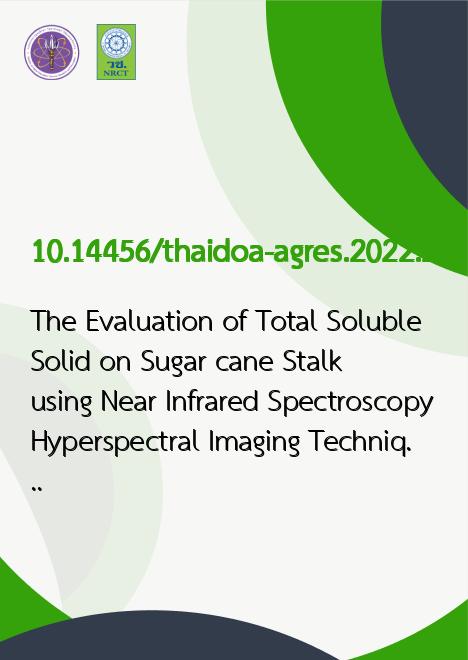
|
The Evaluation of Total Soluble Solid on Sugar cane Stalk using Near Infrared Spectroscopy Hyperspectral Imaging Technique |
|---|---|
| รหัสดีโอไอ | |
| Creator | Jirawat Chiatrakul |
| Title | The Evaluation of Total Soluble Solid on Sugar cane Stalk using Near Infrared Spectroscopy Hyperspectral Imaging Technique |
| Contributor | Kaewkarn Phuangsombut, Anupun Terdwongworakul, Arthit Phuangsombut |
| Publisher | Department of Agriculture |
| Publication Year | 2565 |
| Journal Title | Thai Agricultural Research Journal |
| Journal Vol. | 40 |
| Journal No. | 3 |
| Page no. | 276-287 |
| Keyword | total soluble solid, sugar cane stalk, near infrared spectroscopy hyperspectral imaging technique |
| URL Website | https://at.doa.go.th/journal |
| Website title | Thai Agricultural Research Journal |
| ISSN | 0125-8389 |
| Abstract | Near-infrared hyperspectral imaging technique (NIR-HSI) is an inspection method that is applied to evaluate the quality of agricultural materials without the need to destroy the sample. It is also accurate and fast. In this study, near infrared hyperspectral imaging technique was performed to develop the total soluble solid (TSS) predicting model from Khon Kaen 3 variety sugarcane stalk aged 8-11 months. The obtained data were in the form of three-dimensional spectral data (Hypercube) within wavelength of 900-1700 nm which were derived from reflectance measurement. TSS data from the reference method were used to create a calibration model with Partial Least Squares Regression (PLSR). The sugarcane samples were measured for absorbance before and after stalk's surface wax removal. It was found that the predicting model from samples without wax had the best predictive results, providing coefficient of determination (R2) of 0.87, standard error of prediction (SEP) of 0.97 ?Brix, and RPD of 2.77. This indicated that the predictive equations were effective for use in quality evaluation. The model was thereafter applied to the absorbance data of each pixel in the hypercube data, and the distribution of TSS values on the sugarcane stalk surface was obtained. The distribution map was able to visualise only for the upper half of the cane sample, which was the limitation of this method when measuring a cylindrical object. This still requires further development of appropriate measurements. However, the results showed the feasibility of using NIR-HSI to evaluate the total soluble solid (TSS), which can be used instead of conventional methods in laboratories. It could also be used for visually detecting the right maturity of the sugarcane in the field |